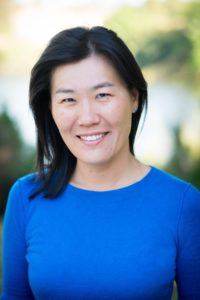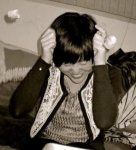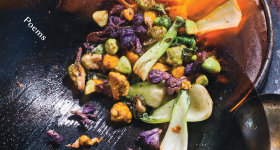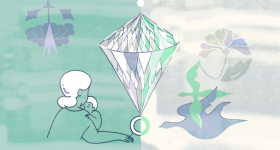On the Asian American Channel of Reddit, there is a subreddit entitled AsianParentStories. An overwhelming number of posts are vignettes about parents, expectations, and moments that too often take an emotionally and verbally abusive turn. For a number of 1.5 and 2nd generation Asian Americans, this facet of our experience is incredibly pervasive and, unfortunately, too normalized. Hence, I was absolutely thrilled as Yi Shun Lai’s debut novel delved into this reality, bringing unexpected depth to its deceptively lighthearted tone.
Written as journal entries, Not a Self-Help Book: The Misadventures of Marty Wu, follows a young Taiwanese American woman coming to terms with her dreams, and more so, her mother. In Marty’s first entry, we are introduced to her obsession with self-help books, her mother’s formidable and ubiquitous presence and her pipe dream of opening a boutique costume shop. Far from the stereotypical depictions of Asian women as personality-less dolls or dragon women, Marty is high-strung, hilarious and blunder-prone. Her affinity for cringe-worthy moments drives her career in advertising to a spectacular end. To escape her embarrassment, she impulsively joins her mother’s trip to visit relatives in Taiwan. Arriving with the motherland’s sweltering summer, Marty finds her relationship with Mama even more fractured as family drama and secrets begins to unfurl.
The novel is breezy and enjoyable due to Marty’s humorous, no-big-deal rendering of the (often dark) events that occur. It is precisely this presentation of pain that makes her such a compelling character. Marty’s unfiltered and self-engrossed world shows us how she survives with an unforgiving person, who is relentless from first introductions.
In her very first journal entry, Marty transcribes a phone conversation in which her mother critiques her occupation: “I am so ashamed of you. Did you know, whenever my friends ask what you do for living, I must say I don’t know? You buy friends, you know, that’s what people who work in advertising do. On television, they never talk about people in advertising. They talk about editors and writers. Why can’t you be one of those? At least then I hold my head up high.” Marty cracks a joke and blows it off -- after all, it’s just a typical thing her mother says.

Yi Shun Lai
Marty’s mother mostly feels like a faceless caricature, heightened by the fact that Marty only ever refers to her as Mama, and only once does she mention Mama’s name. Mama, the obvious antagonist, is an unlikeable woman who is far too unreasonable and belligerent. Mama is our mothers and fathers -- the ones who have abused us, said we weren’t good enough and made as feel as though nothing we do will ever satisfy their high hopes. How do we cope? How do we stand up for ourselves? Marty copes. The ways in which she copes, also teases out the cultural complexities that undercut the interactions we have with parents.
Marty also fights back, which I had expected to be the most powerful moment. Yet when she finally stands up for herself, it wasn’t particularly empowering or relieving. It didn’t make Mama kinder or gentler. In fact, she ended up victimizing Mama!
The book, or Marty, I should say, is ceaselessly surprising and entertaining. I laughed out loud, my jaw dropped lower than I thought it could (mostly at her limitless inappropriateness) and yelled in frustration. As the pages thinned, I had no clue how it would conclude. Well, it certainly wasn’t the rainbows, sunshine and a suddenly-loving-mother ending I wanted. It was more honest. What Marty ultimately shows us is an alternative to coping and fighting, one that is heartening and more powerful.
Lai’s debut is an unexpectedly radical book on our deeply complicated relations with parents. Marty and her world, while hilarious, is underscored with a sadness that’s difficult to place. Is it Marty? Her life? Mama? Us? Whatever it is, Lai has certainly captured the strangeness that comes from harboring a multitude of conflicted feelings.
Since I’ve finished the book, one scene has returned to me again and again. At one point, Marty’s one friend tells her, “I didn’t know it was that bad.” At the time, I rolled my eyes, of course she didn’t. Marty didn’t know it was that bad. It feels like Lai has shined a light, acknowledged the existence of this intensely private experience. Through Marty, Lai tells us she knows how bad it is, how bad it can be, and offers a possible way in which things can be made better. Most importantly, I hope this book will bring solace to those for whom living with Mama is a reality. But then again, remember, this isn’t a self-help book.










Comments